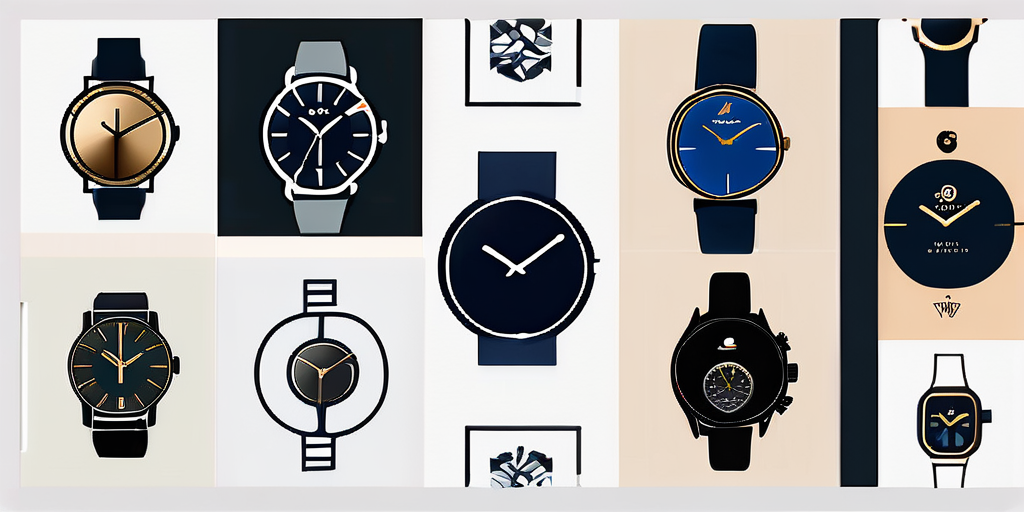A Beginner's Guide to Choosing the Perfect Watch for You
Watches are not just time-telling devices; they are also stylish accessories that reflect one's personality and taste. With so many options available, finding the perfect watch can be quite overwhelming, especially for beginners. This guide aims to simplify the process and help you make an informed decision based on your preferences and needs.
The Basics of Watches: A Beginner's Guide
Before delving into the world of watches, it's crucial to understand the basics. One of the most important factors to consider when choosing a watch is its movement. There are two main types: quartz and mechanical.

Quartz watches are powered by a battery and are known for their accuracy and low maintenance. The quartz movement revolutionized the watch industry when it was first introduced in the 1970s. It uses a small piece of quartz crystal that vibrates at a precise frequency when an electric current is applied to it. This vibration is then converted into a regular pulse, which drives the movement of the watch hands. The use of quartz technology made watches more affordable and accessible to the masses, and it quickly became the dominant movement type in the market.
On the other hand, mechanical watches are powered by a mainspring and require regular winding or wearing to keep them running. They offer a more traditional and intricate watchmaking experience. Inside a mechanical watch, you'll find a complex system of gears, springs, and levers that work together to measure time. The mainspring is wound either manually by turning the crown or automatically through the natural motion of the wearer's wrist. This mechanical marvel not only tells time but also captures the imagination of watch enthusiasts with its intricate craftsmanship and timeless appeal.
Understanding Watch Movements: Quartz Vs. Mechanical
Aside from movement, another aspect that sets watches apart is complications. Complications refer to any additional features on a watch that go beyond timekeeping. These can include chronographs, moon phases, and even tourbillons.
Complications can add functionality and complexity to a watch, catering to different interests and needs. For example, if you value precision and timing, a chronograph will be a useful complication. A chronograph is essentially a stopwatch integrated into the watch, allowing you to measure elapsed time with precision. This feature is particularly popular among athletes, pilots, and anyone who needs to track time accurately.
On the other hand, a moon phase complication may appeal to those who appreciate the aesthetic beauty and connection to nature. A moon phase complication displays the current phase of the moon on the watch dial, adding a touch of celestial elegance to the timepiece. This feature is not only visually captivating but also serves a practical purpose for those who rely on the moon's cycle for various activities such as fishing, gardening, or simply enjoying the night sky.
Exploring Complications: Beyond Timekeeping
When it comes to complications, the possibilities are endless. Some watches feature multiple complications, combining various functions into one exquisite timepiece. For example, a watch might have a perpetual calendar complication, which not only displays the date but also automatically adjusts for leap years, ensuring that the date is always accurate. Others may have a tourbillon complication, which is a mesmerizing mechanism that counters the effects of gravity on the watch's accuracy. These intricate complications showcase the pinnacle of watchmaking craftsmanship and are often found in high-end luxury watches.
Ultimately, choosing a watch with the right movement and complications is a personal decision that depends on your preferences, lifestyle, and budget. Whether you opt for the precision of a quartz watch or the mechanical marvel of a mechanical timepiece, the world of watches offers a vast array of options to suit every taste and style.
Navigating the Watch Brand Landscape
Now that you have an idea of the types of watches available, let's explore some popular watch brands that define the industry.

Iconic Watch Brands That Define the Industry
Brands like Rolex, Omega, and Patek Philippe are renowned for their craftsmanship, innovation, and timeless designs. These brands often come with a higher price tag, but they offer exceptional quality and are considered investments.
Emerging Watch Brands to Watch Out For
For those looking for unique and up-and-coming brands, there are plenty of options to explore. Independent watchmakers like Söner Watches are known for their attention to detail and innovative designs. This type of brand is often more accessible in terms of price while still delivering exceptional craftsmanship.
Choosing the perfect watch is a personal journey that should not be rushed. Consider your lifestyle, preferences, and budget when making a decision. Whether you opt for a classic pilot watch or a practical diver watch, remember that a watch is more than just a timepiece; it's a reflection of your style and personality.